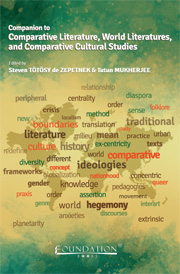Book contents
- Frontmatter
- Contents
- Introduction to the Companion to Comparative Literature, World Literatures, and Comparative Cultural Studies
- PART 1 Theories of Comparative Literature, World Literatures, and Comparative Cultural Studies
- The Contextual Study of Literature and Culture, Globalization, and Digital Humanities
- Comparative Literature and Ex-centricity
- Possibilities and Limits of Comparative Literature Today
- Comparative Cultural Studies and Pedagogy
- Teaching World Literatures
- Comparative Literature and the History of Literature
- Meltzl de Lomnitz, Comparative Literature, and Philosophy
- Comparative Cultural Studies and Cultural Anthropology
- Comparative Literature and Interart Studies
- Gender and Genre in Comparative Literature and (Comparative) Cultural Studies
- Comparative Cultural Studies and Translation Studies
- Comparative Cultural Studies and the Study of Medieval Literature
- Comparative Cultural Studies and Linguistic Hybridities in Literature
- Comparison and Postcoloniality
- (Inter)mediality and the Study of Literature
- PART 2 Comparative Literature in World Languages
- PART 3 Examples of New Work in Comparative Literature, World Literatures, and Comparative Cultural Studies
- PART 4 Multilingual Bibliography of Books in Comparative Literature, World Literatures, and Comparative Cultural Studies
- Index
Comparative Cultural Studies and Pedagogy
from PART 1 - Theories of Comparative Literature, World Literatures, and Comparative Cultural Studies
Published online by Cambridge University Press: 05 April 2014
- Frontmatter
- Contents
- Introduction to the Companion to Comparative Literature, World Literatures, and Comparative Cultural Studies
- PART 1 Theories of Comparative Literature, World Literatures, and Comparative Cultural Studies
- The Contextual Study of Literature and Culture, Globalization, and Digital Humanities
- Comparative Literature and Ex-centricity
- Possibilities and Limits of Comparative Literature Today
- Comparative Cultural Studies and Pedagogy
- Teaching World Literatures
- Comparative Literature and the History of Literature
- Meltzl de Lomnitz, Comparative Literature, and Philosophy
- Comparative Cultural Studies and Cultural Anthropology
- Comparative Literature and Interart Studies
- Gender and Genre in Comparative Literature and (Comparative) Cultural Studies
- Comparative Cultural Studies and Translation Studies
- Comparative Cultural Studies and the Study of Medieval Literature
- Comparative Cultural Studies and Linguistic Hybridities in Literature
- Comparison and Postcoloniality
- (Inter)mediality and the Study of Literature
- PART 2 Comparative Literature in World Languages
- PART 3 Examples of New Work in Comparative Literature, World Literatures, and Comparative Cultural Studies
- PART 4 Multilingual Bibliography of Books in Comparative Literature, World Literatures, and Comparative Cultural Studies
- Index
Summary
Abstract: In their article “Comparative Cultural Studies and Pedagogy” Ronald Soetaert and Kris Rutten combine the concept of education with culture and literacy. Soetaert and Rutten start by analyzing the concept of cultural literacy as it was developed in traditional back-to-basics rhetoric followed by the problematization of the concept of literacy as developed in the field of multiliteracies and the concept of the study of culture as developed in comparative cultural studies. As a result of their postulates, Soetaert and Rutten present the outline of a framework for pedagogy with comparative cultural studies as theory and practice for the relevance of the teaching of students for competent and non-exclusionary participation in democracy, as well as for the acquisition of knowledge in culture.
Introduction
From the perspective of education, the concept of culture is often combined with literacy. The combination cultural literacy and pedagogy has become a field in the 1980s, inspired by the alleged lack of it (see, e.g., Levine). Meanwhile the at-risk trope has become widely spread: (Western) civilization, humanities, culture, universities, youth, etc. are all said to be at risk or in crisis. Many disciplines—from history to science, from literature to mathematics—have used the notion of cultural literacy to describe the fact that students lack the basic knowledge teachers assume they would have mastered as part of their general education. Thus, the back-to-basics movement came about as an answer to problems in education and society.
- Type
- Chapter
- Information
- Companion to Comparative Literature, World Literatures, and Comparative Cultural Studies , pp. 63 - 74Publisher: Foundation BooksPrint publication year: 2014

